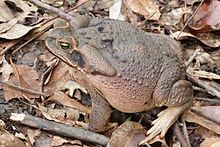Rhinella diptycha
| Rhinella diptycha | |
|---|---|

| |

| |
| Two variants showing opposite extremes in the amount of dark markings possible in the species | |
| Scientific classification | |
| Domain: | Eukaryota |
| Kingdom: | Animalia |
| Phylum: | Chordata |
| Class: | Amphibia |
| Order: | Anura |
| Family: | Bufonidae |
| Genus: | Rhinella |
| Species: | R. diptycha |
| Binomial name | |
| Rhinella diptycha (Cope, 1862) | |

| |
| Range in red | |
| Synonyms | |
| |
Rhinella diptycha, sometimes referred to as Cope's toad, Schneider's toad, cururu toad, or rococo toad, is a toad found in northern Argentina, Paraguay, Uruguay, eastern Bolivia, and eastern and southern Brazil.[1][2][3]
Classification
It is one of three rather similar species sometimes referred to as "cururu toads" in Brazil, the others being R. jimi and R. marina (cane toad). Like those, R. diptycha is a large toad, females up to 25 cm (9.8 in) in snout–to–vent length and males up to 18 cm (7.1 in).[3]
Rhinella diptycha is a widespread and very common species that occurs in a variety of habitats but most commonly in open and urban ones. It breeds in permanent and temporary ponds, preferring ones without much vegetation.[1] Its natural habitats include dry savanna, freshwater marshes, and intermittent freshwater marshes. It is threatened by habitat loss. It is sometimes kept as a pet,[4] but pet trade is not occurring at levels that would constitute a threat.[1]
References
- ^ a b c d Lucy Aquino; Steffen Reichle; Guarino Colli; Norman Scott; Esteban Lavilla & Jose Langone (2004). "Rhinella diptycha". IUCN Red List of Threatened Species. 2004: e.T54628A11177973. doi:10.2305/IUCN.UK.2004.RLTS.T54628A11177973.en.
- ^ Frost, Darrel R. (2020). "Rhinella diptycha (Cope, 1862)". Amphibian Species of the World: an Online Reference. American Museum of Natural History. Retrieved 24 January 2020.
- ^ a b "Rhinella schneideri". AmphibiaWeb: Information on amphibian biology and conservation. [web application]. Berkeley, California: AmphibiaWeb. 2016. Retrieved 3 April 2016.
- ^ "About Rococo Care". Ask Toadily Toads. Retrieved 3 April 2016.

